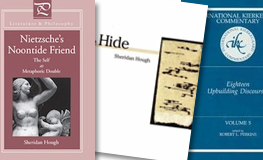
KIERKEGAARD'S DANCING TAX COLLECTOR
 Reviews of Kierkegaard's Dancing Tax Collector
Reviews of Kierkegaard's Dancing Tax Collector
"Hough deserves praise for bringing forcefully to the fore the real challenge involved in any attempt to affirm the value of human existence. An ardent advocacy of Kierkegaard, Hough's book reflects an impressive mastery of his corpus .[T]his readable book vigorously asks the right (and difficult) questions, and does so in a way which intentionally diverges from more conventional philosophical discussion."
(Sharon Krishek, Notre Dame Philosophical Reviews)
"Hough uses the tantalizing image of the inauspicious knight of faith (who, Johannes de Silentio tell us, looks just like a bourgeois philistine tax collector) as a unifying theme to guide her investigation of Kierkegaard’s polyphonic corpus. Written in lively, engaging narrative form, Hough’s book would make a good point of entry to those newcomers who find the idea of starting with the man himself too daunting, and with a student’s guide too dreary." (Will Rees, The Times Literary Supplement)
"Although there are numerous merits to this book, three of them in particular deserve mention. First, the playful and novelistic style of the book, which extends from Hough's own experience as a poet and novelist, is both refreshing and entirely appropriate for engagement with Kierkegaard and his particular literary approach to faith. At the same time, however, in her playfulness Hough does not discard the seriousness (i.e., Alvor) with which Kierkegaard himself believes the question of faith is to be raised and pursued. Second, Hough does an excellent job of drawing out the theme of motion within Kierkegaard's thought—something which is not only explicit in her focus on the four ‘movements’ of the tax collector, but which is particularly clear in the postlude to the book where she emphasizes how the lived disposition of faith is akin to walking and to dancing (hence the dancing tax collector). In this sense, Hough's work nicely joins forces with that of scholars such as Clare Carlisle in offering a valuable re-articulation of how Kierkegaard's existentialism plays out as a philosophy of becoming. Third, Hough's book makes an important contribution to forwarding the promising research program begun not too many years ago that has centered on the task of placing Kierkegaard into dialogue with phenomenology and major thinkers from this tradition. In the end, even as she affords a prominent role in her approach to the voices of Husserl, Heidegger, and Dreyfus, she is nevertheless successful in making sure that they do not overpower either her voice or the voices of Kierkegaard and his various characters." (Matthew T. Nowachek, The Heythrop Journal)
"Hough presents a faithful rendition of themes found throughout Kierkegaard’s corpus, albeit...in a novel fashion. The musical metaphor Hough uses is reminiscent of the technique called “sampling,” in which riffs and motifs are borrowed from different musical pieces in order to provide emphasis or counterpoint to the new composition. Moreover, Hough’s tone is conversational, which is no easy feat...What Hough achieves is an overture, so to speak, of Kierkegaard’s thought." (Roy Allan B. Tolentino, Budhi: A Journal of Ideas and Culture)
"Hough’s bringing of Kierkegaard into dialogue with, for example, Nietzsche, Heidegger, the Holocaust, and Buddhism, shows a willingness to engage and stretch the parameters and implications of Kierkegaard’s thought...[Her] stylistic approach highlights the book’s tension of trying to embody Kierkegaard’s thought as well as diagnose it. What can certainly be said to Hough’s credit is that she has taken ‘form’ seriously, and this is certainly an intelligent way to read Kierkegaard."
(Aaron Edwards, Studies in Christian Ethics)
Advance praise for Kierkegaard's Dancing Tax Collector
"Would that more philosophers were novelists. The novel would be much better were this true. More important, Sheridan Hough's philosophical work provokes imaginings of what philosophy could become if there were more people writing with such verve and panache and thinking with such lucid and compelling worldliness. In her hands phenomenology becomes what it could never become in Husserl or Heideggerâa philosophical perspective capable of convincing us that Kierkegaard's multiple perspectives on life provides dramatic renderings of spiritual values we can find nowhere else."
Charles Altieri, Rachel Stageberg Anderson Chair in the Department of English, University of California, Berkeley
"A lively and thought-provoking account of Kierkegaard's understanding of faith and love. Sheridan Hough's book is a pleasure to read, especially her illuminating comments on commitment and silence, in particular Heidegger on reticence."
Hubert Dreyfus, Professor of Philosophy in the Graduate School at the University of California, Berkeley
"It's unusual to find a study of Kierkegaard focussed on just one character from amongst his variegated and often weird cast of pseudonyms, parables, and fictional personalities, but this is what Sheridan Hough does in this new and lively study ... Hough's tax-collector proves to be a point of departure for what is a brilliant reading of Kierkegaard that shows how Kierkegaardian faith can illuminate intractable issues of human beings' experiences of horrific and pointless suffering ... thanks to her lightness of touch and patent existential passion this is not just another academic book about Kierkegaard but a moving statement of what his thought can mean and do for us today."
George Pattison, 1640 Professor of Divinity, University of Glasgow
"Kierkegaard's account of the life of faith turns on an astonishing claim: a person living faithfully continually enjoys, and takes part in, everything. What can this assertion actually mean? The pseudonymous author of Fear and Trembling, Johannes de silentio, imagines what such a human being might look like; indeed, as de silentio puts it, 'He looks just like a tax collector'. This seemingly ordinary person, in his 'movements' of faith, finds infinite significance and an absorbing joy in his environment, from moment to moment. How does he do it? This characterization of faithful comportment is unique in the Kierkegaardian corpus, and becomes the tantalizing centerpiece of an exploration of the Kierkegaardian self.
Sheridan Hough embarks on a groundbreaking 'existential/ phenomenological' investigation of the uncanny abilities of the faithful life through an analysis of Kierkegaard's 'spheres of existence'; each sphere reveals a specific kind of significance, and indeed a way of 'being in the world'. Hough employs a distinctively original narrative voice, one that examines Kierkegaard's ontology from the perspective of his pseudonymous voices, and from the characters that they create. This approach is both descriptive and diagnostic: by understanding what someone living out an aesthetic, ethical, or a religious existence seeks to achieve, the phenomenon of the faithful life, and its demands, comes into sharper focus. This faith is not simply some thought about God's greatness-indeed, the 'propositional content' of faith is a central issue of the book. Instead, Hough argues that Kierkegaardian faith is the hallmark of the fullest flowering of a human life, one achieved in ways only hinted at in the demeanor of the cheerful and enigmatic 'tax collector,' an existential task in which 'temporality, finitude is what it is all about'."
BUY THE BOOK

